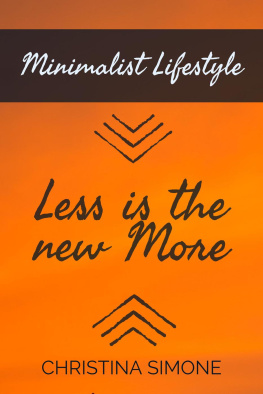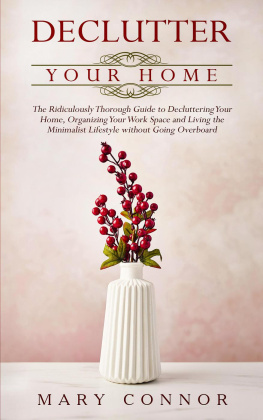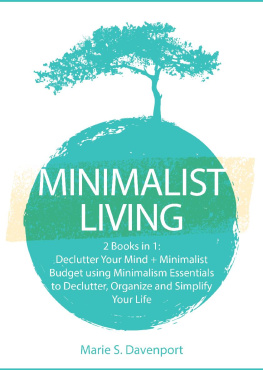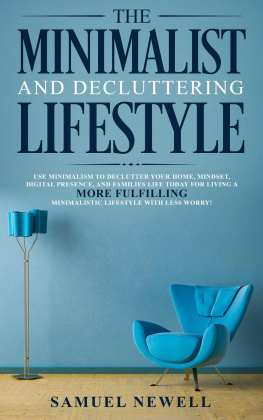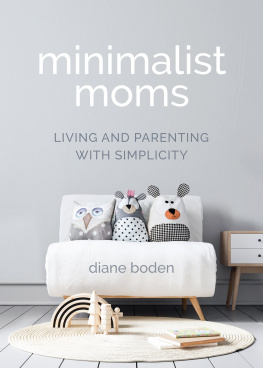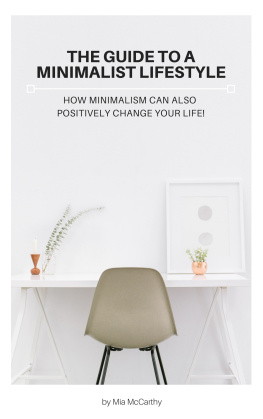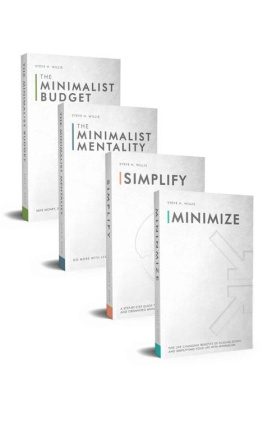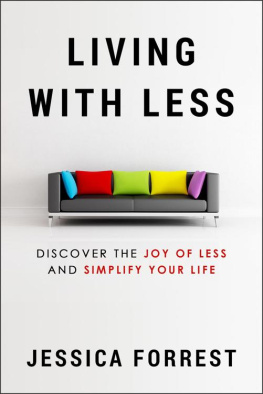This book is dedicated to myparents who adopted a lot of the tenets of minimalism and passed on these rulesto the children.
Chapter 1- Defining the Minimalist Lifestyle
Thoughit may seem so to the person on the outside looking in, a minimalistic lifestyledoes not have to mean a radical change in ones way of life. The core statementof those living in this manner is that downsizing on material objects and theclutter in their life can lead to more important aspects of existence beingfocused on. In essence, the message being received is that with fewerdistractions, growing as a person and becoming extra productive is a moreeasily obtainable goal. Simple living is a completely voluntary choice and isnot another term for poverty. Although many lessons may be learned bywitnessing this lifestyle, the goal for the people living it is not to make astatement but to improve themselves.

Thereare quite a few misconceptions about minimalism and simple living. Though somemay practice the action, living a more simple life does not mean constantlycounting ones possessions. There is no required number of items one must own.The most important factor to consider when it comes to personal objects isdesire versus need. By making sure that they only keep the items that arenecessary to their existence, people engaging in minimalistic lifestyles cancontrol what they may be distracted by. Often times, items such as a televisionmay be deemed unnecessary and removed from the equation. Though that may be a commonchoice, there are not right or wrong items and the process changes for everyindividual.
Purgingexcess belongings from ones household may be a common form of simplisticliving, but there are other ways to practice the lifestyle as well. Controllingthe diet is another frequent practice. Often, the goal in this area is to eatnatural food choices. This is not the same as simply looking to eat healthily,but instead to eat foods that are not too heavily processed. Portion controlplays into this as well. Gorging oneself is considered a wasteful practice andis looked at as a conflict with a minimalists ideals.
Thereare quite a few reasons as to one might choose this lifestyle for themselves.One factor could stem from monetary concerns. Many times, due to spending lesson unnecessary items and consuming less in all respects, there is aconsiderable decrease in expenditures. Learning to become more frugal may be adifficult process for some, but often times it leads to less stress and anoverall boost in self satisfaction. Many who have found themselves in debtconsider the frugality of this mindset to be a helpful tool in pullingthemselves out.
Forothers, thinking about living a simple lifestyle may be a more spiritualdecision about improving their sense of self. These people do not merely lookat necessary versus unnecessary, but instead also attempt to analyze theirrelationship with their inanimate objects. It is important for them to not givetoo much meaning to their possessions. The rallying point here is that thereare far more important connections to be had found elsewhere.
Arelationship with a phone may be sacrificed to establish a more powerfulconnection with another person, just as one with a television may be sacrificedto leave more room open for reading a good book. With less clutter, thesepractitioners intend to open themselves up to a better version of the personthey are. Many focus on improving an art or practice with the new time theyhave granted themselves, such as painting or writing.
Yetanother reason some may find themselves longing to begin a minimalisticlifestyle is to lessen their impact on the environment. Purely on principle, asimplistic life is compatible with that of a person attempting to live a moregreen life. Plainly put, it is common knowledge that cutting down onconsumerism cuts down on needless waste. When one spends less, it causes achain reaction. Purchasing less packaged goods leads to opening less packagedgoods, which obviously leads to less rubbish. With less garbage being producedsome may feel they are leaving a positive impact on the planet.
Thoughthere are many different aspects to take into consideration when questioningwhy one may be turned onto simple living, the results and benefits wind up essentiallyadding up to the same outcomes. As previously mentioned, oftentimes it leads toa decrease in stress. With less to split ones attention between there are lessdistractions to be had and more time to focus on what truly leads to oneshappiness. There is more time to be shared amongst the positive factors inlife.
Workingto become healthier, creating art, relaxing, and sharing more time with familymembers are all products reported by those who take part in making the effortto live this way. Other benefits that have been noted are the newfound ease inorganizing for some, what with their new lack of clutter. Another aspect ofnote is the near effortlessness of sustaining this lifestyle. With monetaryresources not being stretched as thin, there is more comfort to be found. Withless to maintain, many people have found solace in this lifestyle, and swear byits practicality and advantages as pure fact.
Attimes, those who do not practice a minimalist lifestyle have been known to havelooked at the process as a harsh choice weighed down with radical changes andstrict rules. The truth however is not so extreme. Simple living is more of astate of mind than a tangible thing. By being mindful of their own impact andfocusing on what is important, people are already practicing the life choice.There is no right way. It is a continual process, one that can be started byany type of person at any stage in their life. Many who live this life have arelaxed attitude towards the method. Though it may never be the desired way oflife for everyone, living a minimalistic lifestyle has undoubtedly affectedmany people for the better.
Chapter 2- The Advantages of theMinimalist Lifestyle
Peoplewho embrace a minimalist lifestyle are often admired for their environmentalawareness and their willingness to do without a hoard of material possessions.In fact, the focus of simple living is much more about what you get than it isabout what you give up. For those who choose it, simplicity delivers enormousbenefits, including the ones below.




